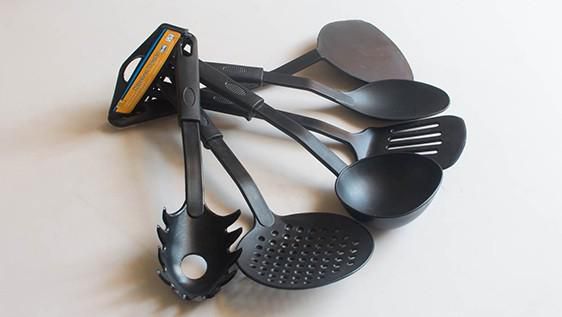Breaking News: Heat Resistant Plastics Called Polyamides Used In Cooking Utensils Can Seep To Foods To Cause Liver And Thyroid Issues.
Source: Thailand Medical News Nov 07, 2019 6 years, 3 months, 2 weeks, 6 days, 1 hour, 47 minutes ago
A recent study conducted in Germany By the German Federal Institute for Risk Assessment (BfR) has found that cooking spoons, spatulas or whisks made from heat resistant plastics called polyamide (PA), can have components of this plastic migrate from the utensils into the food and consequently ingested by consumers.

These plastic components are oligomers. They are composed of a few similar molecules of simple plastic building blocks made of specific starting chemicals. They are formed unintentionally during the production of plastics. Due to their small size, some oligomers can migrate from plastic into food. This opinion considers oligomers from two different polyamides, which are mainly used in the production of kitchen utensils. These are PA 6 (starting chemical: caprolactam) and PA 6,6 (starting chemicals: adipic acid and hexamethylenediamine).
In its study, the BfR told
Thailand Medical News that they had assessed the health risk of cyclic oligomers that migrate from the PA-varieties PA 6 and PA 6,6 into food. In the absence of experimental toxicological data, the first assessment of the health hazard potential was based on the concept of "threshold of toxicological concern". This approach classifies substances of unknown toxicity on the basis of their chemical structure into so-called Cramer classes. Each of these classes is assigned to a maximum daily intake that is unlikely to possess a risk to
human health. The PA oligomers considered here were assigned to Cramer class III and accordingly to a daily intake of 90μg relative to a person weighing 60 kg.
Data from the years 2016/2017 showed that the amounts of cyclic PA oligomers migrating from kitchen utensils into food can be much higher. In order to perform a conclusive risk assessment, the BfR recommended within its opinion that manufacturers of food contact materials compile toxicological data in accordance with the specifications of the European Food Safety Authority (EFSA) and make them available to BfR.
Manufacturers have submitted studies on the toxicity of various cyclic PA compounds to the BfR. Based on this new data, PA 6 (dimer to octamer) and PA 6,6 (monomer to tetramer) oligomers were assessed using a group approach. The compounds have been assessed as non-genotoxic. However, high doses cause adverse effects in the liver and thyroid which are due to metabolisation. Based on the available data, the amount of 5 mg/kg of food was assessed as being toxicologically acceptable as group migration value for the compounds mentioned. For orientation: According to European Plastics Regulation (EU) No. 10/2011, an adult is assumed to consume one kilogram of food every day that has come into contact with food contact material.
In 23 out of 33 items the group migration of cyclic PA oligomers originating from kitchen utensils, investigated in 2016/2017, was less than 5 mg/kg of food. However, in 10 of the 33 items the release exceeded 5 mg/kg of food. For this reason, manufacturing processes of kitchen utensils made of PA should be optimised in order to minimise the migration of PA oligomers. The BfR recommends that consumers keep contact with food as brief as possible when using PA kitchen gadgets, especially at high temperatures (above 70 °C).
Reference: Polyamide Kitchen Utensils: Keep contact with hot food as brief as possible : BfR Opinion No 036/2019 of 17 September 2019 D
OI: 10.17590/20191025-145320 , https://www.bfr.bund.de/cm/349/polyamide-kitchen-utensils-keep-contact-with-hot-food-as-brief-as-possible.pdf
